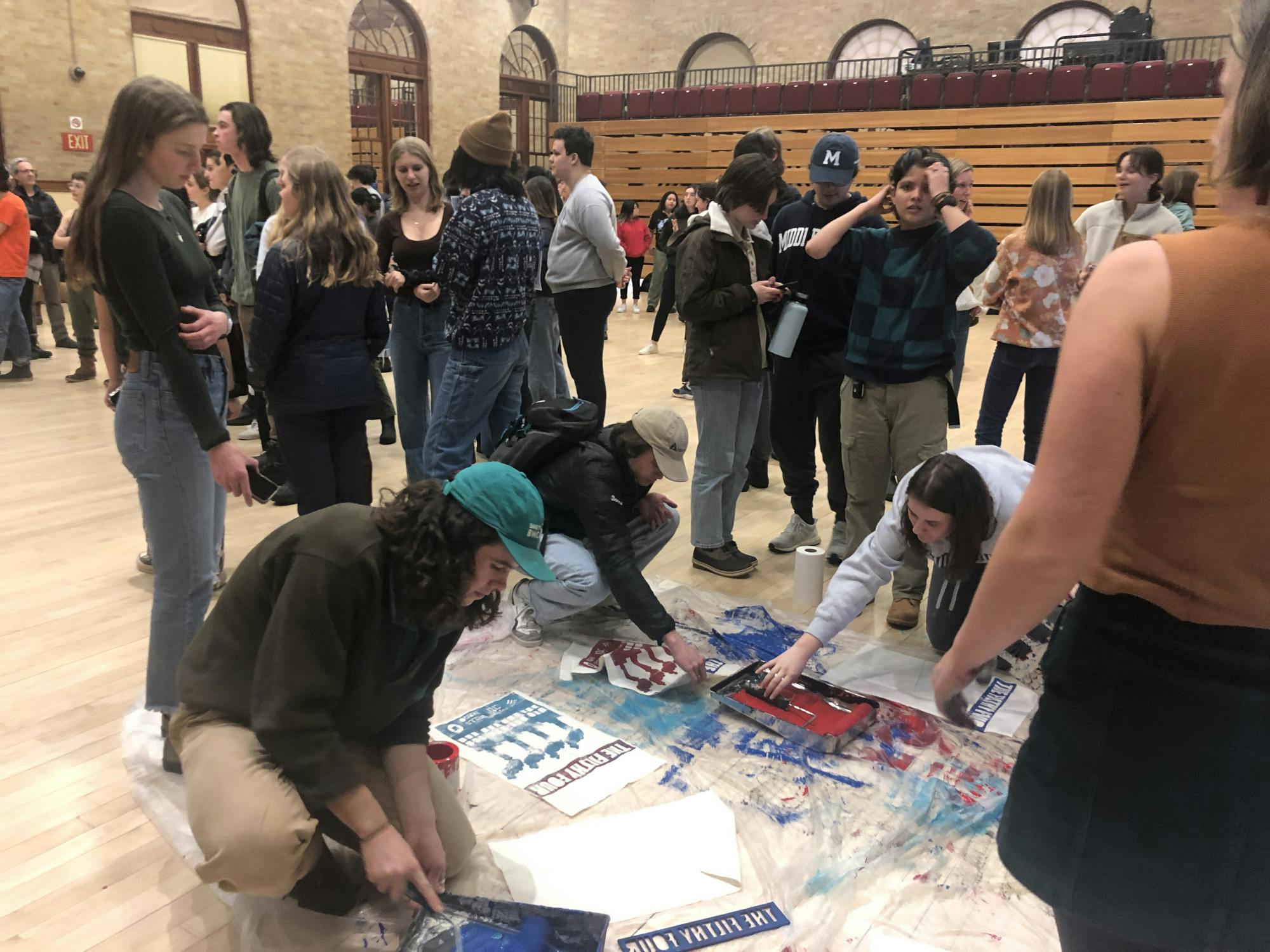Approximately 100 Middlebury students, professors, administrators and community members gathered inside Wilson Hall to protest Middlebury’s contract with Chase Bank due to its investments in the fossil fuel industry on March 14. The demonstration was organized by the Sunday Night Environmental Group (SNEG) as part of their Stop Dirty Banks campaign this year.
The event featured live music by student band Soopspoon, food and several guest speakers, including Bill McKibben, a well-known author and activist and Middlebury’s Schumann Distinguished Scholar in Environmental Studies at Middlebury. SNEG also had a printmaking table for attendees to stamp T-shirts and pieces of fabric with anti-Chase messages, in addition to a financial resource table to share information about how to change banks.
Birch Banks ’25 and Anna Geldert ’25, co-directors of SNEG this semester, organized and led the protest in collaboration with other SNEG members. The protest was the latest part of the group’s Stop Dirty Banks campaign this year, which aims to convince the college not to renew its contract with Chase Bank when it expires in 2025.
Stop Dirty Banks is a national campaign run through Third Act, an environmental activist organization for people over 60 that aims to encourage people and organizations to cancel their bank accounts with and cut up their credit cards from JP Morgan Chase, Wells Fargo, Bank of America and Citibank. The campaign targeted these banks because they have made the largest investments in the fossil fuel industry. In 2021, Chase Bank invested $51.3 billion into the fossil fuel industry.
“There's just really not a way to look at it sustainably and say that it's okay to bank with Chase,” Banks said. “We understand there are a lot of circumstances that go into choosing a particular bank, and that's something that we have put a lot of thought into. We also started to do research and realized there are alternatives that will probably work for the school.”

Students gathered in Wilson Hall for live music, food and a number of speeches.
David Provost, executive vice president of finance and administration, expressed his willingness to collaborate with SNEG in the next two years to explore alternative banks.
“Business decisions made by the college are always made in the best interest of the college. Our students, our alum, faculty and staff voices are important,” Provost said.
The college currently uses Chase Bank for its Purchasing Card (P-card) system. According to JP Morgan Chase, P-cards are issued by businesses to their employees in order to simplify making purchases and consolidate payments. Middlebury issues P-cards to its employees and other departments such as the Student Activities Office to streamline expense management.
"We very aggressively issue a lot of P-cards because from a finance and accounting standpoint it is a way to centralize. So we need the tool of a P-card,” Provost said.
According to Alberto Citarella, associate vice president for finance and assistant treasurer, Middlebury’s P-card system currently has 900 active users with $17 million in sales volume last year.
Provost explained that Middlebury is currently in a three-year contract with Chase Bank for its P-card system, which will end in 2025. In line with its typical practices, the college used a Request for Proposal (RFP) process to solicit proposals from multiple banks.
Among other factors like the compatibility with Oracle Finance, an important consideration for the college to weigh is the proposed volume rebate. According to Provost, the rate is generally around 2–3% for a volume rebate that is earned by making purchases and returned to the college to help offset expenses.
“JP Morgan gave us the best rate at the time… We did an RFP process, they were the most competitive,” Provost said. “I'm hopeful that if we have a broad enough net, and banks who are more responsible desire to get our business, they will be close to what JP Morgan [offered].”
He added that the college is willing to work with SNEG on finding a new bank during an open RFP process in 2024 leading up to the contract’s possible renewal in 2025.
“I have no issue with doing an open RFP process to find a bank who can meet our needs. I would love to see more student engagement around our efforts as individuals and humans on our impact on climate change,” Provost said.
However, Provost also acknowledged the importance of managing college finances when considering these decisions.
“If the students come back with a recommendation to go with Bank X, and Bank X is half the [current] rebate, we will have a difficult time justifying that because of our fiduciary responsibility,” he said.
Banks and Geldert both shared an optimistic outlook for further collaboration with Middlebury following a fall meeting between several members of SNEG with Provost, Citarella and Derek Hammel, director of investments and treasury operations. Banks and Geldert described the college as welcoming to their perspective on this issue.
“I think that the school is really receptive to looking at, what are the reasons that we should change from JPMorgan Chase as the provider for our operating account, and what we now need to look for in terms of like a different bank,” Banks said. “I will say that we've been in contact with other banks, and it seems promising.”
Provost expressed a similarly positive spirit about the collaboration with SNEG this year and into the future as the exploration process and contract negotiations continue.
“I wholeheartedly welcome student involvement in the decisions like these, as I worked for three years with SNEG back in 2017 to 2019 on Energy2028. The student involvement led to a better outcome for the college. We achieved this by working together respectfully and openly,” Provost said. “The group of students with interest in our P-card provider are approaching this work in the same manner, and we welcome it.”
Geldert shared an update on where SNEG and Middlebury are in the process of discussing alternative banks and entering into the ongoing negotiation process during the next two years.
“We just got the school to start talking to one [bank] that we picked out that we really like and Bill McKibben has kind of approved. So we've been talking to [the bank]. And we've been talking to the school. And I think they're just starting to talk to each other, which is something we're really excited about,” Geldert said.
The protest featured many speakers with different experiences with Chase Bank and perspectives on climate change. McKibben was the demonstration’s keynote speaker, speaking about his decades of experience in climate activism and how Third Act is now working to use older people’s influence to affect change.
“The real prize is not switching on our credit cards and perfecting our lives, the real prize is getting these big banks to change. That’s why we do this to put pressure on them,” McKibben said. “Middlebury can be a really powerful place for making that happen.”
He further shared an anecdote about how Vermont legislators considering proposals for the state to divest from fossil fuels had learned from the college and its own process of divestment that occurred several years ago. McKibben shared how influential the “Middlebury Model” was in these conversations by easing the concerns of legislators and giving them a successful example of climate reform.
“So the work of those kids who have long since graduated and gone out into the world… is continuing to accelerate and make real positive, powerful change. So what you’re doing here is really important,” McKibben said.
Fran Putnam, a community representative from Weybridge,Vt. and member of SNEG, shared her perspective on working with college students as part of the local community.
“I really enjoy the interconnection between younger people, and older people,” Putnam said. She also spoke about how she made the personal decision four years ago to switch her bank from Chase.
“It probably took four months to make sure we got them all. And then we said, ‘OK, we're done.’ And we cut those credit cards up.” Putnam said. “Our family realized this was important. We did it four years ago, and it’s been very successful, there have been no bad consequences, it’s possible to do it and I encourage other people to look into it.”
SNEG members Asha Kannan ’26 and Nínive Carmen Calegari ’26 both spoke at the protest. In an interview with The Campus before the demonstration, they shared their experiences of continuing to make an impact on climate change through their personal finances and experience changing accounts from banks such as Wells Fargo and United Bank.
“I think a big hope is that students consider where they open their first credit card, they consider switching their credit card, or they ask their parents, ‘How are we spending our money as a family?’” Calegari said.
Kannan added that she hopes the protest will enable students to learn from one another about the impact of their personal financial decisions and how to factor sustainability into those choices.
“I think sometimes finances seem very daunting, and having a student talking to other students makes that a little bit easier,” Kannan said. “I think if I was having somebody else teach me who I could relate to, I think that makes the experience a lot easier to navigate.”

Attendees use printmaking supplies.
Event speaker Charlotte Roberts ’25.5 shared her perspective about how students can avoid complacency and create change in their own lives. “Here at Middlebury we are basically entirely reliant upon the systems that perpetuate the demise of the planet… How do we rid ourselves of the things on which we depend?” she said. “My guess is one step at a time.”
Robby Burton ’26, a SNEG member who attended the protest, shared his excitement about the turnout for their event. “I’m surprised at how many people responded to the advertising. It’s crazy to see this much support for something I’ve worked on,” he said.
Geldert also spoke to the lack of awareness among students about the college’s partnership with Chase despite the bank’s investment in the fossil fuel industry.
“To come to the school and not know that about Chase Bank, and the relationship with Chase Bank — again, not like totally blaming the school for that — but it just doesn't really align with the values of the majority of the student body, a lot of the professors and the school as a whole,” Geldert said.
Geldert added that one of the central goals of the protest was to increase student participation in the Stop Dirty Banks campaign so that students can better support SNEG’s efforts to change Middlebury’s bank.
“I think student involvement is really important, though, too, because the administration isn't gonna get there on their own. They need to see that people are passionate about the issue and that organizations like SNEG are really trying to move forward with stuff,” Geldert said. “But at the same time, I think it's been overall a really good relationship with [the administration] so far.”
Middlebury partnered with Champlain College and St. Michael’s College through the Green Mountain Higher Education Consortium (GMHEC) when entering its current contract with Chase. According to Provost, this partnership increased the college’s buying and negotiation power during the RFP process, and they intend to partner together again for the upcoming contract.
“I've had a conversation with the [GMHEC] Chief Operating Officers and the other CFOs, just as a heads up that this interest was going on on the campus,” Provost said. “Because we're in Vermont, because we have shared values, I think the issue of sustainability is a criteria that they would support.”
SNEG plans to continue its campaign against Chase Bank throughout the rest of the year and into 2024. The group will continue to partner with the college while spreading awareness about the impact students can have in promoting sustainable financing.
“As consumers, people have power. As consumers, students have power, even when they don't feel like they do,” Calegari said. “There are ways for our voices to be heard and to use the means with which you have to make a change.”
Will Hinkle ’26 spoke to the assembled crowd about the importance of starting the process of switching banks. After his speech, Hinkle joined several other audience members in cutting up his Chase Bank credit card. “No, I have not switched banks. I’m doing this today to signify my commitment to ending my ties with Chase Bank. Why haven’t I switched yet? Well, because it’s a process,” he said.

Ryan McElroy '25 (he/him) is the Editor in Chief.
Ryan has previously served as a Managing Editor, News Editor and Staff Writer. He is majoring in history with a minor in art history. Outside of The Campus, he is co-captain of Middlebury Mock Trial and previously worked as Head Advising Fellow for Matriculate and a research assistant in the History department. Last summer Ryan interned as a global risk analyst at a bank in Charlotte, North Carolina.




